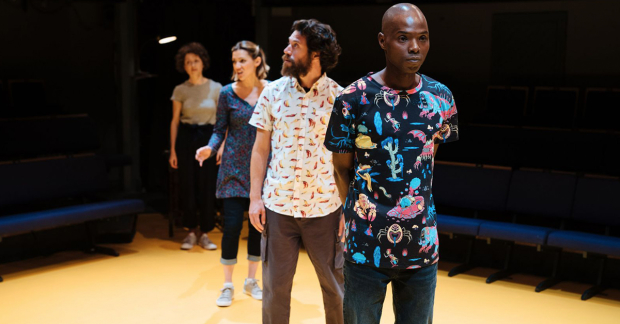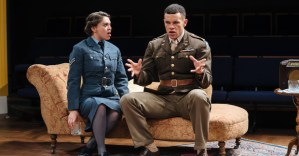Review: Amsterdam (Orange Tree Theatre)
Maya Arad Yasur’s autobiographical play centres on some dark history in the Dutch capital

© Helen Murray
Not to be confused with Ian McEwan's Booker Prize-winning novel of the same name, Maya Arad Yasur's autobiographical play centres on the darkest chapter in the Dutch capital's modern history; the occupation of the Nazis. Narrated by four performers (the script stipulates a minimum of three), it follows a modern-day resident, a heavily pregnant Israeli violinist, as she tries to source the meaning behind a huge gas bill that is slipped under her door by an elderly neighbour.
Part mystery, part history, her journey becomes both emblematic of the city's past and how it feels to be an ‘outsider' living there today. This of course is a story that will resonate in every European city, not least London where refugees have been coming to find sanctuary for centuries and now find themselves facing fresh existential challenges.
Matthew Xia's production – marking his first as artistic director of the Actors Touring Company (who are co-producing alongside Theatre Royal Plymouth) – takes place on a largely bare stage. The text is delivered rapid-fire and jumps between narration and meta-commentary. This makes it rather disorientating; threads are picked up and dropped, characters flit in and out of focus, fact and fiction blur to the point of indivisibility. To add further complication the flow is often broken by the ringing of a bell, prompting a cast member to head to a microphone in the corner to translate a foreign word or phrase. This is used to largely comic effect while also highlighting the ‘otherness' of foreign tongues.
There are several deliberate longueurs, with mixed results. A lengthy silence that greets the first mention of ‘genocide' is chilling, almost mocking our reverence to the Holocaust; but a clunky scene change midway through is unnecessary and energy sapping. It all feels quite random and messy, almost willingly obfuscatory. Fortunately Daniel Abelson, Fiston Barek, Michal Horowicz and Hara Yannas are a dynamic ensemble, rarely dropping the ball as they rattle off the tongue-twisting text and somehow retaining a sense of individuality even though their words could be randomly assigned.
Despite the somewhat frustrating structure it's refreshing to see a play about the legacy of the Nazis working hard to avoid oft-seen motifs. Its language is strikingly brutal, anti-semitic tropes thrown around like casual swears, while its characters don't always take the turns you expect them to. Some of the violinist's perceived status as an outsider is her own paranoia; some of it is not. And ghosts are everywhere, most chillingly when she feels the echo of Otto Frank's footsteps in her own on the Amsterdam streets.
This is a timely piece, putting contemporary Europe in direct conversation with its past at a time when those demons are reawakening. And it contains particularly salutary messages for Britain as it considers pulling up the drawbridge to the continent. We neglect the past at our peril and Amsterdam brings its voices vividly into focus, even if its style doesn't always serve its subject.
















